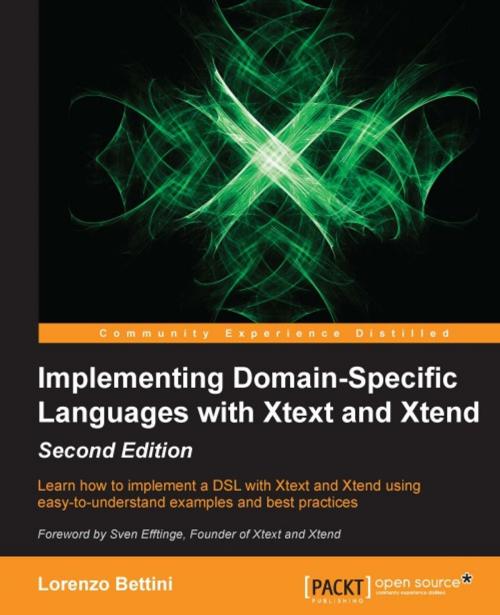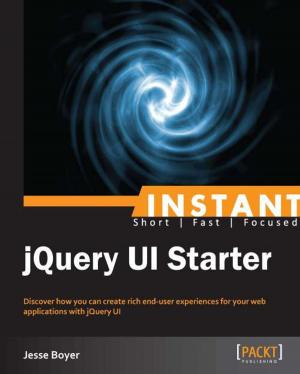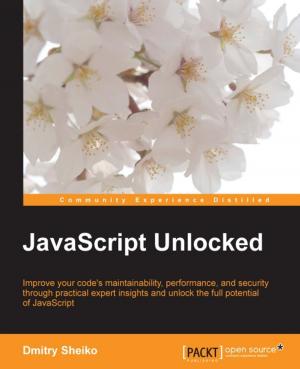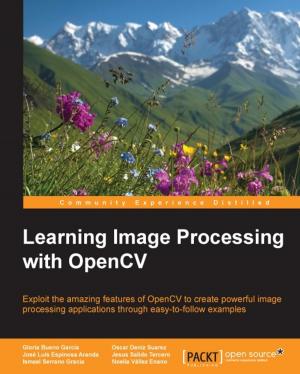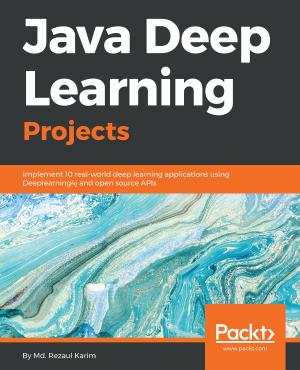Implementing Domain-Specific Languages with Xtext and Xtend - Second Edition
Nonfiction, Computers, Programming, Internet| Author: | Lorenzo Bettini | ISBN: | 9781786463272 |
| Publisher: | Packt Publishing | Publication: | August 31, 2016 |
| Imprint: | Packt Publishing | Language: | English |
| Author: | Lorenzo Bettini |
| ISBN: | 9781786463272 |
| Publisher: | Packt Publishing |
| Publication: | August 31, 2016 |
| Imprint: | Packt Publishing |
| Language: | English |
Learn how to implement a DSL with Xtext and Xtend using easy-to-understand examples and best practices
About This Book
- Leverage the latest features of Xtext and Xtend to develop a domain-specific language.
- Integrate Xtext with popular third party IDEs and get the best out of both worlds.
- Discover how to test a DSL implementation and how to customize runtime and IDE aspects of the DSL
Who This Book Is For
This book is targeted at programmers and developers who want to create a domain-specific language with Xtext. They should have a basic familiarity with Eclipse and its functionality. Previous experience with compiler implementation can be helpful but is not necessary since this book will explain all the development stages of a DSL.
What You Will Learn
- Write Xtext grammar for a DSL;
- Use Xtend as an alternative to Java to write cleaner, easier-to-read, and more maintainable code;
- Build your Xtext DSLs easily with Maven/Tycho and Gradle;
- Write a code generator and an interpreter for a DSL;
- Explore the Xtext scoping mechanism for symbol resolution;
- Test most aspects of the DSL implementation with JUnit;
- Understand best practices in DSL implementations with Xtext and Xtend;
- Develop your Xtext DSLs using Continuous Integration mechanisms;
- Use an Xtext editor in a web application
In Detail
Xtext is an open source Eclipse framework for implementing domain-specific languages together with IDE functionalities. It lets you implement languages really quickly; most of all, it covers all aspects of a complete language infrastructure, including the parser, code generator, interpreter, and more.
This book will enable you to implement Domain Specific Languages (DSL) efficiently, together with their IDE tooling, with Xtext and Xtend. Opening with brief coverage of Xtext features involved in DSL implementation, including integration in an IDE, the book will then introduce you to Xtend as this language will be used in all the examples throughout the book. You will then explore the typical programming development workflow with Xtext when we modify the grammar of the DSL.
Further, the Xtend programming language (a fully-featured Java-like language tightly integrated with Java) will be introduced. We then explain the main concepts of Xtext, such as validation, code generation, and customizations of runtime and UI aspects. You will have learned how to test a DSL implemented in Xtext with JUnit and will progress to advanced concepts such as type checking and scoping. You will then integrate the typical Continuous Integration systems built in to Xtext DSLs and familiarize yourself with Xbase. By the end of the book, you will manually maintain the EMF model for an Xtext DSL and will see how an Xtext DSL can also be used in IntelliJ.
Style and approach
A step-by step-tutorial with illustrative examples that will let you master using Xtext and implementing DSLs with its custom language, Xtend.
Learn how to implement a DSL with Xtext and Xtend using easy-to-understand examples and best practices
About This Book
- Leverage the latest features of Xtext and Xtend to develop a domain-specific language.
- Integrate Xtext with popular third party IDEs and get the best out of both worlds.
- Discover how to test a DSL implementation and how to customize runtime and IDE aspects of the DSL
Who This Book Is For
This book is targeted at programmers and developers who want to create a domain-specific language with Xtext. They should have a basic familiarity with Eclipse and its functionality. Previous experience with compiler implementation can be helpful but is not necessary since this book will explain all the development stages of a DSL.
What You Will Learn
- Write Xtext grammar for a DSL;
- Use Xtend as an alternative to Java to write cleaner, easier-to-read, and more maintainable code;
- Build your Xtext DSLs easily with Maven/Tycho and Gradle;
- Write a code generator and an interpreter for a DSL;
- Explore the Xtext scoping mechanism for symbol resolution;
- Test most aspects of the DSL implementation with JUnit;
- Understand best practices in DSL implementations with Xtext and Xtend;
- Develop your Xtext DSLs using Continuous Integration mechanisms;
- Use an Xtext editor in a web application
In Detail
Xtext is an open source Eclipse framework for implementing domain-specific languages together with IDE functionalities. It lets you implement languages really quickly; most of all, it covers all aspects of a complete language infrastructure, including the parser, code generator, interpreter, and more.
This book will enable you to implement Domain Specific Languages (DSL) efficiently, together with their IDE tooling, with Xtext and Xtend. Opening with brief coverage of Xtext features involved in DSL implementation, including integration in an IDE, the book will then introduce you to Xtend as this language will be used in all the examples throughout the book. You will then explore the typical programming development workflow with Xtext when we modify the grammar of the DSL.
Further, the Xtend programming language (a fully-featured Java-like language tightly integrated with Java) will be introduced. We then explain the main concepts of Xtext, such as validation, code generation, and customizations of runtime and UI aspects. You will have learned how to test a DSL implemented in Xtext with JUnit and will progress to advanced concepts such as type checking and scoping. You will then integrate the typical Continuous Integration systems built in to Xtext DSLs and familiarize yourself with Xbase. By the end of the book, you will manually maintain the EMF model for an Xtext DSL and will see how an Xtext DSL can also be used in IntelliJ.
Style and approach
A step-by step-tutorial with illustrative examples that will let you master using Xtext and implementing DSLs with its custom language, Xtend.
